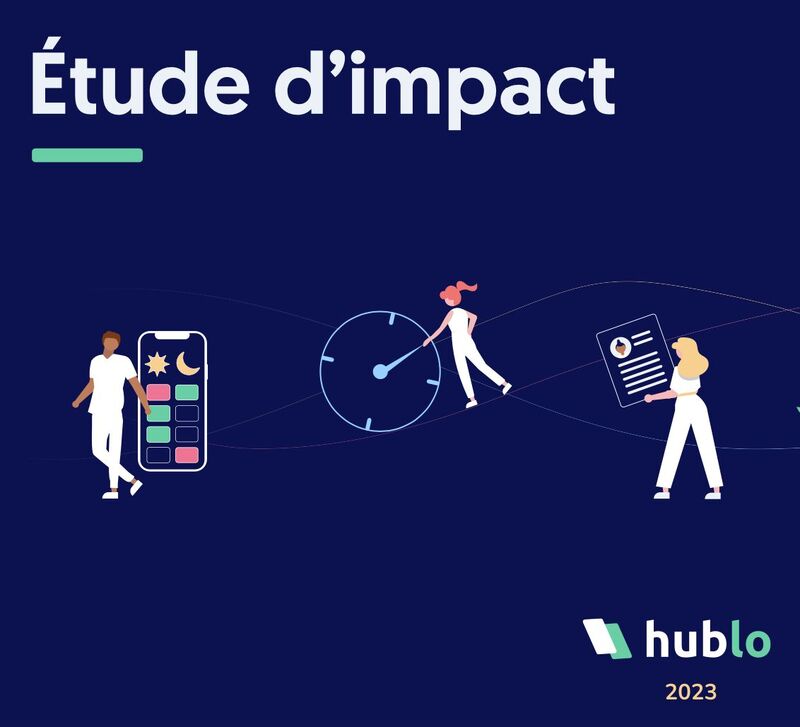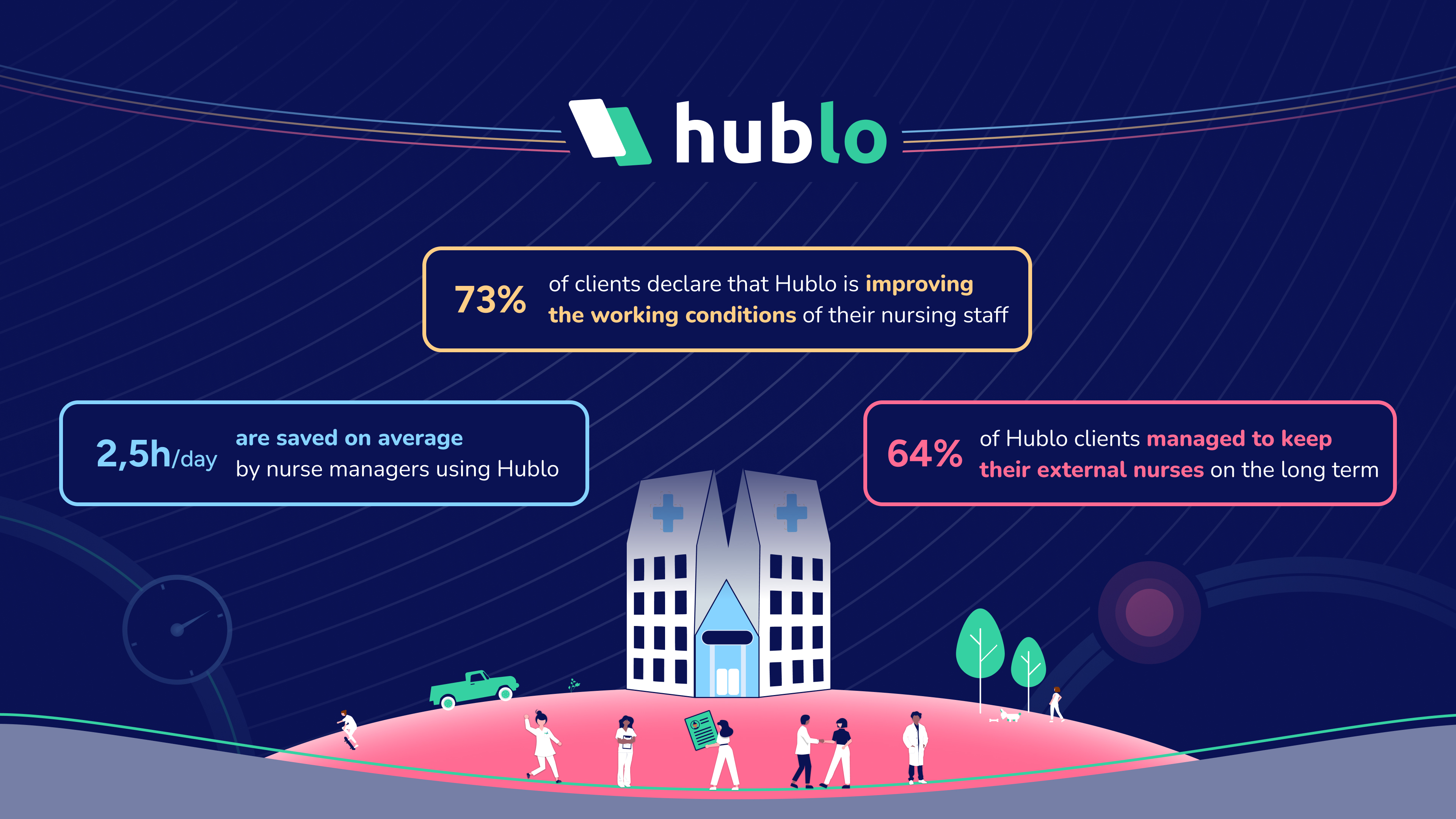
How Hublo Learned To Measure Impact
There are lots of ways to quantify the success and progress of a business. Revenue. The size of the customer base. Investment money raised. Number of employees.
But how does a business truly measure its impact on the world beyond the numbers on its balance sheet? This is a burning question at Revaia because social impact is core to our values as well as those of the companies we back.
That’s why an experiment conducted by one of our portfolio companies, Hublo, has been so interesting.
This health tech startup is making the healthcare system in France more efficient by addressing staffing shortages. Yet counting the number of jobs at medical facilities filled seemed to only scratch the surface of Hublo’s impact. So the company designed a study that goes beyond its core business metrics to define and quantify its larger impact.
This approach and the results from Hublo’s Impact Study offer lessons to other entrepreneurs and investors about why it's important to look at the bigger picture to truly understand the success of a business.
"We had the feeling that we play a role that is bigger than the number of nursing shifts we help fill," said Maxime Renault, Hublo’s Chief Strategy and Expansion Officer. "That we have a positive contribution to the continuity of care in a hospital is what matters in the end."
Hublo’s Mission
Hublo now has about 160 employees. But it began life several years ago as two separate and competing companies: Whoog and Medgo.
The founders of both companies saw an opportunity to tackle the most urgent issue facing healthcare institutions: The chronic shortage of healthcare personnel, especially the categories of paramedical workers who supplement the work of doctors across a wide range of duties.
According to Maxime Renault, there is currently in France a 20% permanent shortage of staff due to a mix of absenteeism and vacancies. Not only does this put pressure on the quality and availability of healthcare on the frontlines, but it also consumes a tremendous amount of time at the administrative level as managers spend growing amounts of time on the phone calling to find replacements. These substitutes come from current staff and their broader healthcare networks.
In July 2020, the companies merged just a few months after the pandemic began. Both had played critical roles in the early days of Covid, with MedGo focusing more on private medical institutions while Whoog had a greater footprint in the public sector. Joining forces made sense to more efficiently serve the entire healthcare sector while also helping the newly christened Hublo more quickly reach the scale it needed to make its business sustainable.
This vision and momentum persuaded Revaia in the summer of 2021 to lead a €22 million investment round for Hublo. The goal of the financing was to help the company’s expansions into Germany, Belgium, Switzerland, and Spain.
While those expansions are proceeding, the company has quietly become a vital part of the healthcare infrastructure in France. Hublo is used by 600,000 people in the medical sector across 2,700 health establishments in its home country. That includes 35% percent of all nurses and 55% of orderlies. Each month, the platform manages more than 500,000 replacement requests.
The results have directly helped reduce staffing shortages, but the effects have rippled beyond the corridors of hospitals. By creating a centralized platform, Hublo has collected data that has sparked interest from the French government because it provides for the first time a global view of how absenteeism is putting the quality of care at risk.
Still, Hublo felt these numbers didn’t fully capture the role it now played.
"These numbers are relatively impressive," Maxime said. "Our scale in the market is impressive and our brand has become part of the healthcare workplace. On the caregiver side, filling a shift is known as ‘doing a Hublo,’ just like doing a Lydia among young people is shorthand for transferring money between friends.. But these numbers measure the impact we have on a daily basis at a facility, but not the magnitude of our impact across the entire healthcare system."
Hublo wanted to dig deeper.
Measuring Impact
The reasons for undertaking such a study are diverse.
Defining the scale of its impact could help communicate to current and future customers about the gap between Hublo and its competition. Emphasizing the leadership could also reinforce barriers to entry, Maxime said.
In addition, clarifying the success of its mission might serve to help recruit talent who want to sense they are part of something bigger. And down the road, such data should be enticing to future potential investors by helping them fully understand Hublo’s value proposition.
Hublo already had some data about the amount of time it saved caregivers and the number of vacancies it helped fill. Now it wanted to answer questions such as: How we can contribute to reducing healthcare costs for society as a whole? How we can improve the working conditions of caregivers?
"We wanted to prove that we are not just a tool that helps fill openings in schedules, but that Hublo is a tool that is key for building the hospital of the future," Maxime said.
Hublo approached Revaia with these ideas, and we helped them figure out what kind of methodology they needed to use and introduced them to impact strategy agencies to help them define the granularity of the analyses they wanted to implement.
"Impact measurement is something that is not yet very codified," Maxime said. "There are many different ways of approaching it, and so together we thought about which measurements to choose."
Hublo sent the survey out to the 2,900 institutions, and representatives of 619 – including HR directors, nurse managers, and caregivers, agreed to fill out the detailed questions and allow for follow-up qualitative interviews.
Among some of the most interesting results:
- The average facility that uses Hublo increased its network of potential replacement caregivers by an average of 275%. That includes both internal and external caregivers. By making the need for replacements more transparent and centralized, more internal candidates would come forward because they wanted to help and make some extra income.
- 64% of the institutions found new replacement workers who are willing to repeatedly fill in, a sign that the platform helps build loyalty which in turn increases the quality of care.
- 88% say Hublo has helped them save time managing replacements, on average about 2.5 hours per day. About 33% said it saves them 3 hours.
- About 50% said they saw overtime hours remain stable or decrease. Because managers have more options, they can choose between offering replacement spots to some workers who might earn overtime or spreading the requests around so the shifts don’t incur overtime wages.
- 70% said they reduced the use of staffing agencies which are necessary but not popular because managers often find them to be costly while such employees are not motivated by wanting to improve the quality of care at a facility.
- Only 21% felt that Hublo contributed to having a direct impact on absenteeism. The company included this finding because it was “humbling,” according to Maxime, but also “motivating.” While it suggests that the company is having a positive impact on continuity of care, it is also a reminder that many factors that determine rates of absenteeism are beyond the scope of its platform, including: burnout, level of pay, lack of training, quality of management, and overall working conditions.

Still, Maxime said this finding will help the company advocate for those issues to be addressed by policymakers while also focusing more resources on developing tools that might help.
"We can play a role here and have an impact," he said. "This is the first time we are now able to say that we are contributing to the question of continuity of care, which is a major global issue we’re facing. And that paves the road ahead for us."
For Maxime, the study more broadly confirmed that Hublo had moved beyond being a tool to just manage existing replacements to being a platform that has helped expand and attract greater numbers of potential replacements. Because it can better articulate these roles and support them with data, Hublo envisions an expanded role for itself in the fight to improve the quality of care.
"Our challenge is to make people understand that the backbone of the hospital is nurses,” he said. “A hospital is a people business. If you don't have the right people in place, you cannot provide any type of care. We are a tool that not only helps attract and recruit, but we can help caregivers be more engaged and more satisfied in their jobs. We now see the impact that we currently make and the impact we expect to have in the coming months."